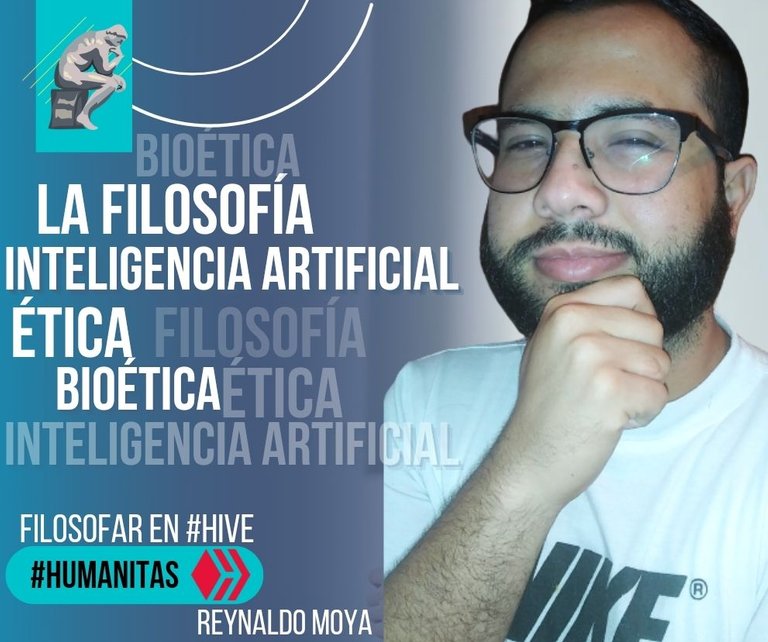
Fuente: Imagen realizada en canva
Comenzamos esta iniciativa a través de un análisis profundo que he realizado sobre la nanotecnología y por ende la inteligencia artificial, no te asustes y vamos a descubrir nuestros conocimientos navegando por los mares de la bioética, por lo que es de suma importancia desde ahora leer con detenimiento y tener buena clasificación para los conceptos con un espíritu crítico, para que así el tema no se preste para confusión y ambos queden muy bien definidos. Por consiguiente, expondremos un poco los fundamentos, conceptos, sobre la inteligencia artificial teniendo como fuente la revista de la universidad de Nueva Granada de Colombia por parte de Jairo Villalba, que apoyado en otros autores dice que la Inteligencia artificial “Se ha convertido en un escenario tecno científico que bajo el marco básico de una disciplina transversal busca entender, modelar y replicar inteligencia y procesos cognitivos, involucrando variables matemáticas, lógicas, mecánicas y principios y desarrollos biológicos” (Frankish y Ramsey, 2015. p. 3)”.
He aquí entonces el primer fundamento, entendiendo que juega o trabaja con una serie de elementos en la que se hace aún más difícil llegar a concretar un concepto claro de la inteligencia artificial, no obstante, no se puede dar por entendido aquello que no se encuentra explícito o que no se ha dicho, por tal razón, viendo la base de Villalba observamos que el tema de los principios cognitivos entra como base, esto precisamente porque estamos hablando de inteligencia y esta va acompañada de cuadros matemáticos, lógicas y mecánicas, es decir de la ciencia en la que el hombre interviene y por ende es generador de cambios. Por eso, es importante destacar la relación que existe entre la inteligencia artificial y el transhumanismo, entiéndase este desde la revista antes mencionada como aquel que “Cuestiona la posibilidad y conveniencia en la transformación de la condición humana, creada y desarrollada mediante tecnologías que disminuyen el envejecimiento de la persona, su capacidad intelectual, física, y psicológica” (Russel y Cohn, 2012,P. 58)”.
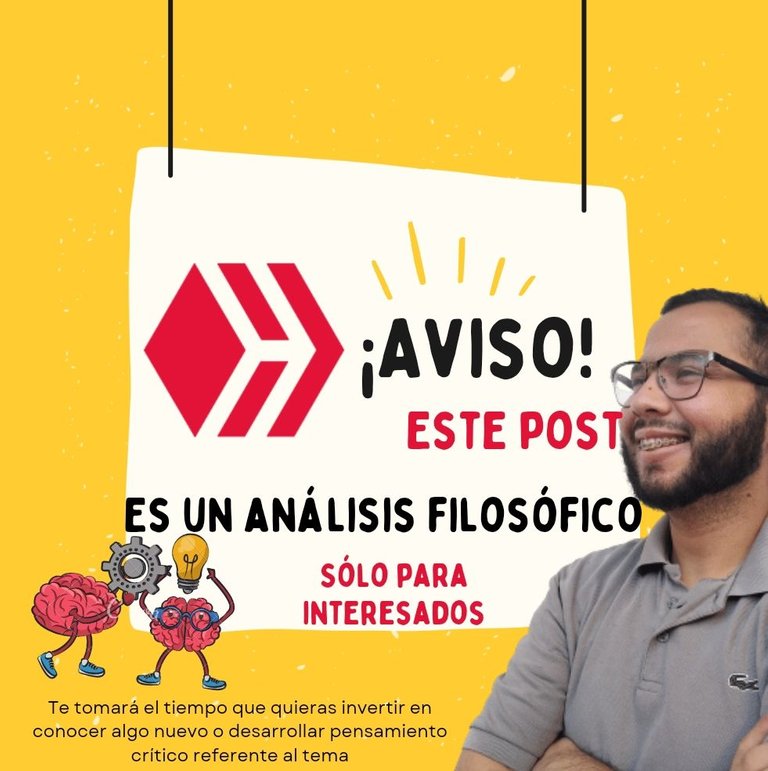
Fuente: Imagen realizada en canva
La inteligencia artificial interviene en el desarrollo cognitivo del hombre, el científico es denominador y el hombre que se ha sometido es dominado, controlado por manos humanas y al mismo tiempo por procesos tecnológicos. Ahora bien, la estrecha relación que se guarda entre el transhumanismo y la inteligencia artificial es precisamente que ambas pasan por el ciclo de vida, tecnología e información, hasta llegar a la nanotecnología, tema que abarcaremos más adelante. Siguiendo entonces con nuestro tema, es importante mencionar el génesis de la inteligencia artificial partiendo desde el punto filosófico con René Descartes y su postura frente a las dos substancias, material y la otra espiritual esto según lo planteado por Flórez y que lo utiliza Villalba como cita para su línea de investigación.
Otro exponente, fue Bacon al escribir su obra “The New Organon” y plantear que “Todo conocimiento deriva de la experiencia, y en particular de la experiencia de los sentidos”. Lo que se está planteando en ambos casos es una cuestión que está por encima de lo visto, de aquello que es palpable, es admitir la realidad de lo sensible, es así pues como la inteligencia artificial comienza a perpetuarse e inicia atacando el sistema neurológico y al mismo tiempo era estructurado en principio por científicos y filósofos, como era la costumbre en aquel tiempo, de esta manera va surgiendo lo que hoy conocemos como inteligencia artificial y que al principio se planteaba con un logaritmo, luego viene la intervención del hombre con la formulación de la máquina y se mezcla entonces la inteligencia, el problema ético surge entonces con la maquinación del hacer, es decir, la relación interpersonal con una máquina y no con otra persona, ¿hasta qué punto entonces el hombre es capaz de decidir?
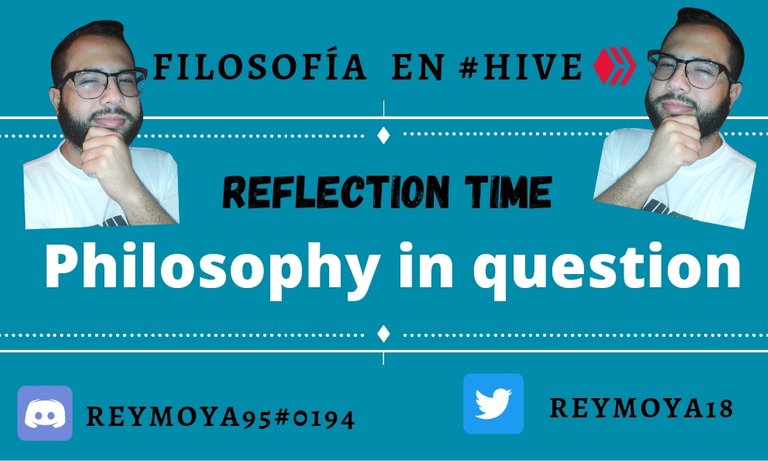
Fuente: Imagen realizada en canva
Es la formulación principal en el plano ético al hablar de inteligencia artificial y dejamos precisamente la pregunta al aire para que el lector pueda sacar sus conclusiones del tema y que no se vea influenciado por una corriente o por conceptos expuestos de nuestra parte, no obstante, para fomentar el criterio y la capacidad de construirse una postura frente a esto, exponemos el enfoque encontrado en la revista publicada por Villalba “Los trabajos desarrollados en inteligencia artificial, han permitido evolutivamente Categorizarla bajo cuatro enfoques (Cairó, 2011, p.15), sistemas que piensan como humanos, sistemas que piensan racionalmente, sistemas que actúan como humanos y finalmente en sistemas que actúan racionalmente.” Con este enfoque entonces y con las reflexiones hechas a lo largo del tema esperamos sea de apoyo para una elaboración crítica del tema por parte del lector.
Habiendo desarrollado la inteligencia artificial, no podemos dejar de lado la nanotecnología, por lo que ahora haremos reflexiones y expondremos conceptos para que al finalizar este análisis se puedan crear posturas individuales y con criterios propios. La nanotecnología hay que tener en cuenta su mezcla, vinculando la ciencia con la caracterización de partículas, una de las grandes caracterizaciones que ha tenido precisamente la nanotecnología es que impacta en la vida humana con el sentido de algo novedoso y es precisamente lo que hace que el hombre fije su mirada en él y comience a desarrollar técnicas, métodos, fórmulas para llevar a cabo un fin. Desde 1983 se viene hablando y avanzando en tema de nano-ciencia y tecnología, ambas mezclan pertenecen a una cantidad de científicos que fueron descubriendo partículas que se podían enlazar para crear algo más grandioso de lo que ya se encontraba tanto en laboratorios como a nivel humano.
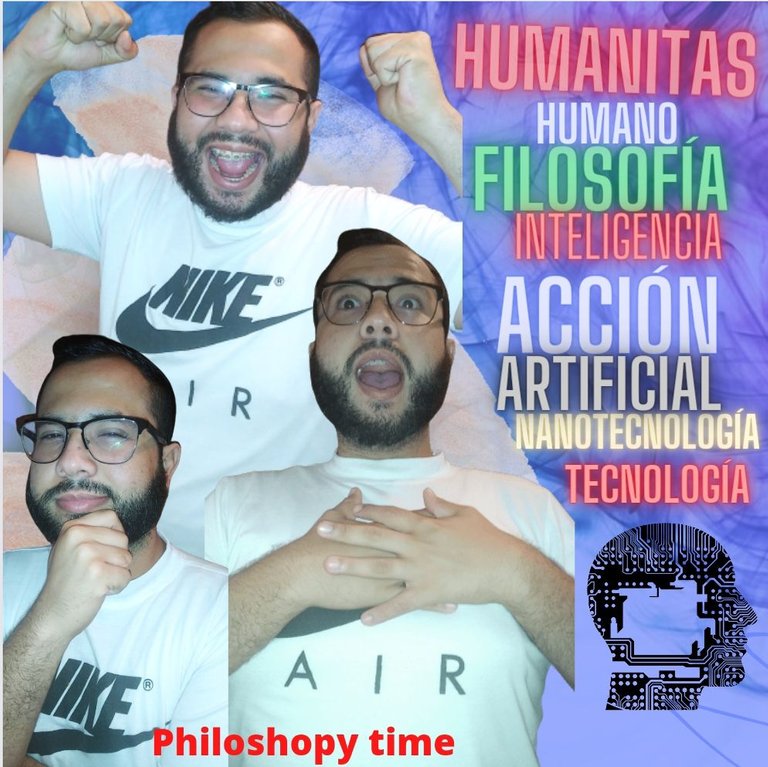
Fuente: Imagen realizada en canva
Sin embargo, otros sostienen que es una creación reciente y muy cotidiana que ha logrado penetrar incluso las grandes industrias, tal es el caso de “La pasta de dientes con nanopartículas que mejoran la absorción del flúor al esmalte” todo esto a simple vista parece ser muy novedoso y he allí el triunfo, no obstante, el problema de la nanotecnología es que no se encuentra claro el modo para adquirir el fin, es decir, cómo se lograron tener los avances o a través de qué para llegar a una mejora, y otra de las preguntas es si esta ha de traer consecuencias, ninguna de estas dos objeciones aparecen dentro del tema y es evidente porque la comercialización es lo primordial, ahora bien, el tema es tan confuso que se presta para un cambio de nombre o comercialización de impacto, pero también para juicios por métodos aplicados a través de ella, tal es el caso con la unión Europea que asigna bajo el nombre de nanoética la responsabilidad de la llamada nanotecnología esto como una urgencia para responder a los problemas éticos que esta conllevaba y darle respuesta.
Es importante tener presente que de la nanotecnología son muy pocas las investigaciones conceptuales que se tienen, sin embargo, es un tema que va en avances incluso a nivel jurídico, así mismo entender la nanotecnología es comprender el afán del hombre en su respuesta ante hechos trascendentales o no comprobables, entender la cantidad de partículas que se pueden distribuir a lo largo del cuerpo humano para obtener un resultado y después estos sean estadísticas de comportamiento o patrón social, es complicado, requiere estudios y seguimientos para no hacer prejuicios tempranos al respecto, otro factor del tema y quizás hasta riesgoso es el manejo de nanotecnología en la vida cotidiana y es que muchas personas no saben, no manejan información acerca de esto que se presenta como novedoso, como de impacto y luego del tiempo pueden estar sufriendo grandes daños por la nanotecnología.
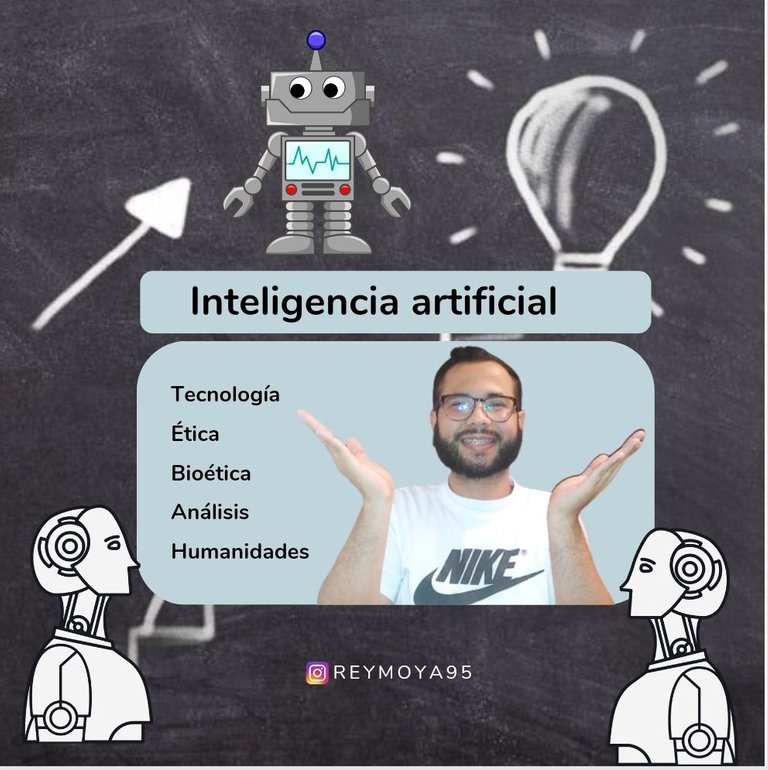
Fuente: Imagen realizada en canva
Queremos dejar en claro que los científicos y personas que se encuentren detrás de estos avances le es inoportuno hablar de riesgos y aclarar en el producto un componente con un fin, por lo que aquí se considera primordial el impacto que el contacto, es decir, importa más que salga al mercado, que la relación de aceptación-rechazo que esta pueda generar por una explicación que científicos la ven innecesaria. Sin embargo, consideramos que una de las razones por la cual no se da a conocer es precisamente por tema de mercado, pero el trasfondo que se esconde es: ¿cuáles son los métodos que se utilizan, que riesgos puede traernos?
No hay una responsabilidad ni sentido de hacerlo, la ética de la nanotecnología queda aislada del hombre, no se vive el presente, sino que al contrario se piensa en lo que puede llegar hacer o en lo que se puede llegar a convertir con el paso del tiempo pasando por encima de lo humano, porque al final lo que importa es el triunfo y no el ser humano, sino los avances tecnológicos que lo alcanzan, de manera que entonces se hace necesario una ética de la libertad responsable con compromisos en el ecosistema, en la naturaleza y en el hombre como generador de cambios, es concientizar a la humanidad que lo artificial no siempre conviene para el desarrollo social.

Fuente: Imagen realizada en canva
Referencias Bibliográficas para el análisis:
-Villalba G. Jairo a., Problemas bioéticos emergentes de la inteligencia artificial, en Universidad Militar Nueva Granada Vol. 12, N. 1 (2016), 137-147.
-Campillo Beatriz; Zuleta Guillermo., Bioética y nanotecnología, en revista lasallista de investigación. Vol. 11, N. 1 (2014), 63-69.
Initiative: The Human Being and Artificial Intelligence: A Bioethical Perspective

Source: Image made in canva
We begin this initiative through a deep analysis that I have done on nanotechnology and therefore artificial intelligence, do not panic and let's discover our knowledge sailing the seas of bioethics, so it is of utmost importance from now on to read carefully and have good classification for the concepts with a critical spirit, so that the subject does not lend itself to confusion and both are very well defined. Therefore, we will expose a little the fundamentals, concepts, about artificial intelligence having as a source the journal of the University of Nueva Granada in Colombia by Jairo Villalba, who supported by other authors says that Artificial Intelligence "It has become a techno scientific scenario that under the basic framework of a cross-discipline seeks to understand, model and replicate intelligence and cognitive processes, involving mathematical, logical, mechanical variables and biological principles and developments" (Frankish and Ramsey, 2015. p. 3)".
Here then is the first foundation, understanding that it plays or works with a series of elements in which it becomes even more difficult to arrive at a clear concept of artificial intelligence, however, it cannot be taken for understood that which is not explicit or has not been said, for that reason, For this reason, looking at Villalba's basis, we observe that the subject of cognitive principles enters as a basis, precisely because we are talking about intelligence and this is accompanied by mathematical, logical and mechanical pictures, that is to say, of the science in which man intervenes and therefore is a generator of changes. Therefore, it is important to highlight the relationship that exists between artificial intelligence and transhumanism, understanding this from the aforementioned magazine as that which "Questions the possibility and convenience in the transformation of the human condition, created and developed through technologies that decrease the aging of the person, its intellectual, physical, and psychological capacity " (Russel and Cohn, 2012,P. 58)".

Source: Image made in canva
Artificial intelligence intervenes in the cognitive development of man, the scientist is the denominator and the man who has submitted is dominated, controlled by human hands and at the same time by technological processes. Now, the close relationship between transhumanism and artificial intelligence is precisely that both go through the cycle of life, technology and information, until reaching nanotechnology, a topic that we will cover later. Continuing then with our topic, it is important to mention the genesis of artificial intelligence starting from the philosophical point of view with René Descartes and his position on the two substances, material and spiritual, as stated by Flórez and used by Villalba as a quote for his line of research.
Another exponent was Bacon when he wrote his work "The New Organon" and stated that "All knowledge derives from experience, and in particular from the experience of the senses". What is being raised in both cases is a question that is above the seen, that which is palpable, is admitting the reality of the sensible, thus artificial intelligence begins to perpetuate itself and starts attacking the neurological system and at the same time it was structured in principle by scientists and philosophers, as was the custom at that time, In this way, what we know today as artificial intelligence arises and that at the beginning it was proposed with a logarithm, then comes the intervention of man with the formulation of the machine and then intelligence is mixed, the ethical problem then arises with the machination of doing, that is, the interpersonal relationship with a machine and not with another person, up to what point then is man capable of deciding?

Source: Image made in canva
It is the main formulation in the ethical plane when talking about artificial intelligence and we leave precisely the question in the air so that the reader can draw his conclusions on the subject and not be influenced by a current or by concepts exposed on our part, however, to encourage the criterion and the ability to build a position on this, we expose the approach found in the review published by Villalba "The work developed in artificial intelligence, have allowed evolutionarily Categorize it under four approaches (Cairó, 2011, p.15 ), systems that think like humans, systems that think rationally, systems that act like humans and finally in systems that act rationally." With this approach then and with the reflections made throughout the topic we hope it will be of support for a critical elaboration of the topic by the reader.
Having developed artificial intelligence, we cannot leave aside nanotechnology, so we will now make reflections and expose concepts so that at the end of this analysis we can create individual positions with our own criteria. Nanotechnology must take into account its mixture, linking science with the characterization of particles, one of the great characterizations that nanotechnology has had precisely is that it impacts on human life with the sense of something new and it is precisely what makes man fix his gaze on it and begins to develop techniques, methods, formulas to carry out an end. Since 1983 we have been talking and advancing on the subject of nano-science and technology, both mix belong to a number of scientists who were discovering particles that could be linked to create something more grandiose than what was already found both in laboratories and at the human level.

Source: Image made in canva
However, others argue that it is a recent and very common creation that has managed to penetrate even large industries, such is the case of "Toothpaste with nanoparticles that improve the absorption of fluoride to the enamel" all this at first glance seems to be very novel and therein lies the triumph, however, the problem with nanotechnology is that it is not clear how to achieve the end, i.e., how the advances were achieved or through what to reach an improvement, and another question is whether this will have consequences, Neither of these two objections appear within the subject and it is evident because commercialization is the main thing, but the subject is so confusing that it lends itself to a change of name or commercialization of impact, but also to judgments for methods applied through it, such is the case with the European Union that assigns under the name of nanoethics the responsibility of the so-called nanotechnology as an urgency to respond to the ethical problems that this entailed and to give an answer to it.
It is important to keep in mind that there is very little conceptual research on nanotechnology, however, it is a subject that is advancing even at the legal level, and to understand nanotechnology is to understand the eagerness of man in his response to transcendental or unverifiable facts, to understand the amount of particles that can be distributed throughout the human body to obtain a result and then these are behavioral statistics or social pattern, Another factor of the subject and perhaps even risky is the handling of nanotechnology in daily life and many people do not know, do not handle information about this that is presented as novel, as of impact and then in time may be suffering great damage by nanotechnology.

Source: Image made in canva
We want to make it clear that the scientists and people behind these advances find it inopportune to talk about risks and to clarify in the product a component with a purpose, so here the impact is considered more important than the contact, that is to say, it matters more that it comes to market, than the acceptance-rejection relationship that it can generate by an explanation that scientists see as unnecessary. However, we believe that one of the reasons why it is not made known is precisely because of market issues, but the underlying reason is: What are the methods used, what risks can it bring us?
There is no responsibility or sense of doing it, the ethics of nanotechnology is isolated from man, it does not live in the present, but on the contrary it thinks about what it can do or what it can become with the passage of time passing over the human, because in the end what matters is the triumph and not the human being, but the technological advances that reach him, so that then it becomes necessary an ethic of responsible freedom with commitments in the ecosystem, in nature and in man as a generator of changes, is to make humanity aware that the artificial is not always convenient for social development.

Source: Image made in canva
English translation from Deepl.com
Bibliographical references for analysis:
-Villalba G. Jairo a., Problemas bioéticos emergentes de la inteligencia artificial, in Universidad Militar Nueva Granada Vol. 12, N. 1 (2016), 137-147.
-Campillo Beatriz; Zuleta Guillermo, Bioethics and nanotechnology, in revista lasallista de investigación. Vol. 11, N. 1 (2014), 63-69.
Interesante tema, espero seguir leyéndolo
Gracias por leer y comentar. Es un espacio para estudiarlo analizar y compartir. Saludos
~~~ embed:1620038237720047616 twitter metadata:NDEyMjU4Mjg2Mnx8aHR0cHM6Ly90d2l0dGVyLmNvbS80MTIyNTgyODYyL3N0YXR1cy8xNjIwMDM4MjM3NzIwMDQ3NjE2fA== ~~~
The rewards earned on this comment will go directly to the people( @acont ) sharing the post on Twitter as long as they are registered with @poshtoken. Sign up at https://hiveposh.com.
!PIZZA
I gifted $PIZZA slices here:
@jesusalejos(4/10) tipped @reymoya95 (x1)
Learn more at https://hive.pizza!
You went a little bit too far in the past. AI is a 20th century thing, although its real pinnacle has been in this century. But if we talk about technique and technology in general, those reflections of Descartes and Bacon may be relevant. On philosophy about AI, Alan Turing can be a good starting point.
I agree with you that I went too far but it is part of the research and conclusions we must make. Artificial intelligence although it is a topic of the 20th century as you mention, in the past already via an idea of human replacement or developers, now well, at that time it was too early to call it as we know it today being the same technological advances that has strengthened it.
Thanks for your contribution to the STEMsocial community. Feel free to join us on discord to get to know the rest of us!
Please consider delegating to the @stemsocial account (85% of the curation rewards are returned).
You may also include @stemsocial as a beneficiary of the rewards of this post to get a stronger support.
I liked this article for presenting the topic with an everyday language, with images that express the pleasantness of the text.
Good work @reymoya95
Me agradó este artículo por presentar el tema con un lenguaje cotidiano, con imágenes que expresan lo ameno del texto.
Buen trabajo @reymoya95
Gracias por el comentario y la lectura, es un post que recoge lo actual pero se remonta a la edad filosófica porque muchas teorías están, solo las hemos ido transformado. Saludos